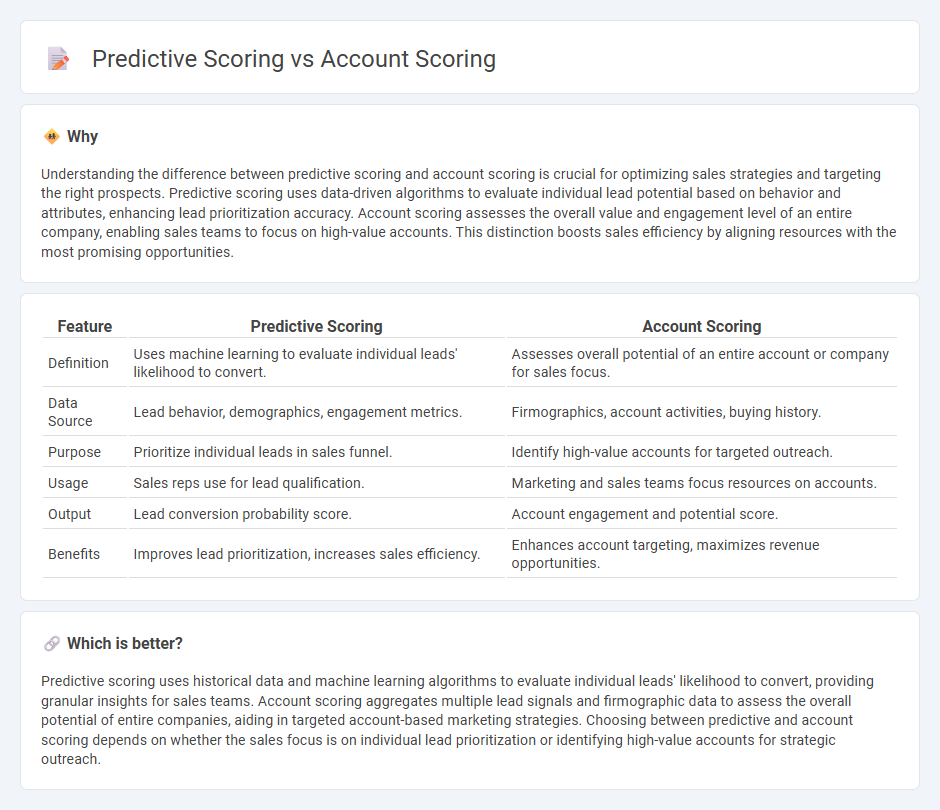
Predictive scoring uses machine learning algorithms to analyze historical sales data and identify the likelihood of individual leads converting into customers. Account scoring evaluates overall company attributes and engagement metrics to prioritize accounts with the highest revenue potential. Explore how combining predictive and account scoring can optimize your sales strategy and boost conversion rates.
Why it is important
Understanding the difference between predictive scoring and account scoring is crucial for optimizing sales strategies and targeting the right prospects. Predictive scoring uses data-driven algorithms to evaluate individual lead potential based on behavior and attributes, enhancing lead prioritization accuracy. Account scoring assesses the overall value and engagement level of an entire company, enabling sales teams to focus on high-value accounts. This distinction boosts sales efficiency by aligning resources with the most promising opportunities.
Comparison Table
| Feature | Predictive Scoring | Account Scoring |
|---|---|---|
| Definition | Uses machine learning to evaluate individual leads' likelihood to convert. | Assesses overall potential of an entire account or company for sales focus. |
| Data Source | Lead behavior, demographics, engagement metrics. | Firmographics, account activities, buying history. |
| Purpose | Prioritize individual leads in sales funnel. | Identify high-value accounts for targeted outreach. |
| Usage | Sales reps use for lead qualification. | Marketing and sales teams focus resources on accounts. |
| Output | Lead conversion probability score. | Account engagement and potential score. |
| Benefits | Improves lead prioritization, increases sales efficiency. | Enhances account targeting, maximizes revenue opportunities. |
Which is better?
Predictive scoring uses historical data and machine learning algorithms to evaluate individual leads' likelihood to convert, providing granular insights for sales teams. Account scoring aggregates multiple lead signals and firmographic data to assess the overall potential of entire companies, aiding in targeted account-based marketing strategies. Choosing between predictive and account scoring depends on whether the sales focus is on individual lead prioritization or identifying high-value accounts for strategic outreach.
Connection
Predictive scoring utilizes historical sales data, customer behavior, and market trends to estimate the likelihood of a lead converting into a customer, while account scoring aggregates these predictions at the company level to prioritize high-potential accounts. Both methods leverage machine learning algorithms and CRM analytics to improve sales targeting and resource allocation. Integrating predictive scoring with account scoring enhances sales efficiency by identifying key opportunities and optimizing outreach strategies.
Key Terms
Account Scoring:
Account scoring evaluates potential customers based on firmographic data, engagement metrics, and buying behavior to rank accounts' likelihood to convert or grow. It leverages historical data, industry trends, and customer profiles to assign scores that help sales and marketing teams prioritize leads and tailor outreach effectively. Explore deeper insights on how account scoring boosts revenue and improves targeting strategies.
Firmographics
Account scoring evaluates potential clients based on firmographic data such as company size, industry, and location to categorize accounts by likelihood to engage. Predictive scoring employs machine learning models that analyze historical firmographic and behavioral data to forecast future account success and conversion rates. Explore how leveraging firmographic-driven scoring enhances targeted marketing strategies and sales efficiency.
Engagement Level
Account scoring evaluates overall customer value by aggregating factors like purchase history, firmographics, and engagement metrics, offering a broad view of account potential. Predictive scoring uses machine learning models to analyze engagement level patterns such as website visits, content interaction, and email opens, predicting future behavior or propensity to buy. Discover how mastering engagement-based predictive scoring can refine targeting and boost conversion rates.
Source and External Links
Account Score | Adobe Marketo Engage - Experience League - Account scoring systematically aggregates lead scores to gauge the level of engagement and prioritize accounts most likely to purchase, by combining scores like product interest and web engagement at the account level.
Account Scoring in ABM - Free Template and Guide - xGrowth - Account scoring evaluates target accounts by applying a scoring scheme across key parameters to identify the most valuable and conversion-ready accounts, leveraging customizable criteria and points to reflect account status.
B2B Account Scoring Done Right: Definition, Process, and ... - Account scoring ranks customer accounts based on fit to the ideal customer profile and engagement, helping prioritize high-value accounts for outreach, often triggering sales action when thresholds are met.
 dowidth.com
dowidth.com